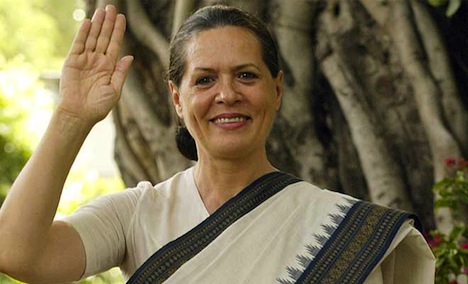Sonia Gandhi, the leader of India’s largest party, and a massively influential voice in Indian government, has strongly denounced the Indian Supreme Court’s ruling on Section 377 of the Indian penal code, which effectively re-criminalized same-sex relationships yesterday.![]()
The Supreme Court rejected the earlier 2009 decision of the Delhi High Court, which had interpreted that Section 377 violated several rights guaranteed under India’s constitution, thereby effectively decriminalizing same-sex conduct. India’s Supreme Court yesterday instead ruled that it was up to India’s parliament, not its judiciary, to address Section 377.
Gandhi forcefully called on India’s parliament to take up the issue by amending Section 377 in a way that makes it clear that she believes same-sex conduct should not be criminalized:
“The High Court had wisely removed an archaic, repressive and unjust law that infringed on basic human rights enshrine din our Constitution. This Constitution has given us a great legacy, a legacy of liberalism of openness, that enjoin us to combat prejudice and discrimination of any kind. We are proud that our culture has always been an inclusive and tolerant one. The Supreme Court also suggested another course. I hope the Parliament will address this issue and uphold the constitutional guarantee of life and liberty to all citizens of India, including those affected by this judgement.”
As the leader of the governing Indian National Congress (Congress, भारतीय राष्ट्रीय कांग्रेस), her strong condemnation makes it possible that India’s parliament just might enact a legislative fix.
Gandhi’s statement cleared the way for several high-profile members of India’s government to attack the decision. Finance minister P Chidambaram said he was extremely disappointed with the decision, and he argued that the decision, by upholding a law enacted in 1860, embodies colonial-era reasoning. Kapil Sibal, India’s minister for law and justice, after a somewhat non-committal statement yesterday, today issued a call clearly supporting government action to neutralize the Supreme Court’s decision:
“I am disappointed, and, it is unfortunate that the Supreme Court has upheld the legality of Section 377. The High Court was right on this issue. Right now, there are several options before the government, and, we are exploring all of them. This government believes in firm and quick action, and, we will do that. We will adopt a policy that will provide relief at the earliest,” he said.
Congress, which likes to wrap itself in its legacy as the party that delivered Indian to independence in 1947 under Jawaharlal Nehru, a leader of the independence movement and later, India’s first prime minister, would jump at the chance to attack Section 377, above all, as a relic of Victorian-era repression inflicted upon India by its British colonial rulers.
Fresh off its massive political victory in regional elections earlier this month in Delhi, the anti-corruption Aam Aadmi Party (AAP) also announced its disapproval of the decision and its support for repealing or amending Section 377.
In contrast, the center-right Hindu nationalist Bharatiya Janata Party (the BJP, भारतीय जनता पार्टी) and Narendra Modi, the chief minister of Gujarat state, and the BJP’s prime ministerial candidate in next spring’s parliamentary elections, have been silent since yesterday’s decision. Sushma Swaraj, the BJP opposition leader in the Lok Sabha (लोक सभा), the lower house of India’s parliament, has called for an all-party meeting to determine whether there’s support to amend Section 377 in the Lok Sabha.
While Muslim and Christian groups have been more active on Section 377 in India than Hindu groups, the conservative BJP doesn’t exactly fit the mould of a party willing to take a progressive stand in favor of LGBT rights. Baba Ramdev, a top Indian yoga guru, and a leading Modi supporter, has been outspoken in his virulent opposition to homosexuality.
Either way, Gandhi and Congress will find that time is rapidly running out, with the Lok Sabha expected to be dissolved next spring in advance of parliamentary elections that must be held before May 2014.
While Congress could push to amend 377 through legislative action, there’s a chance that the government could also support a ‘curative petition’ that calls on the Supreme Court to reconsider its ruling — such petitions rarely succeed, but such petitions rarely have the full support of Sonia Gandhi behind them.
Both the Congress-led government and the BJP have at least some reason to pull together to support legislation essentially decriminalizing same-sex conduct (once again) in India. Continue reading Is there a potential parliamentary path to amending Section 377 in India?
